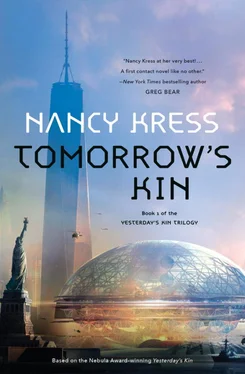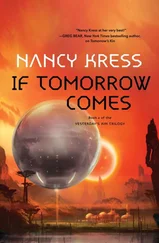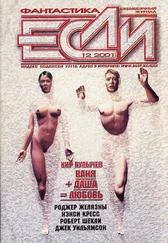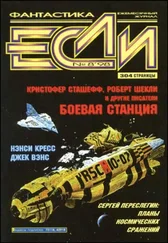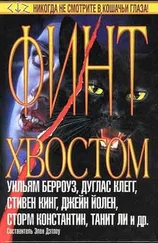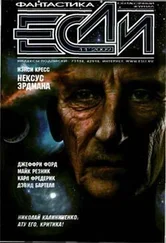“Folks are riled up,” Tim said, without rancor. He was still grinning. Marianne turned away and stared at the darkness rushing past the car window.
She had never seen a person die of spore disease. Only mice.
* * *
One speech in Ohio and one in Pennsylvania, neither violent. The three of them took turns driving the Ford minivan back to New York. Somewhere near Harrisburg, Marianne was at the wheel, Sissy beside her, Tim folded up in the backseat, asleep even though it was only late afternoon. Thin April sunshine cast long shadows on empty fields beside the turnpike. One long stretch was littered with downed trees; a tornado had come through here a few weeks ago. April was the start of a robust tornado season in a state that, once, had seldom experienced them.
Sissy said quietly, “You don’t like this.”
“April? No. I never did.” Kyle had died in April, which every year brought grief not that her alcoholic husband was dead of cirrhosis, but that her main emotion had been relief. Surely a long marriage—any marriage—deserved more than that.
“Not April,” Sissy said. “You don’t like giving speeches. But you were a teacher.”
Marianne smiled, grimly. “I lectured mostly to graduate students who were eager to hear me. Or if not eager, at least resigned—not like these speeches. Nobody in Bio 572, Theories of Punctuated Evolution, was armed.”
“But you do it because you think it’s important. That’s really brave, Marianne.”
Tears blurred the road; immediately Marianne blinked them away. Why couldn’t Ryan or Elizabeth see it like that? Elizabeth, now transferred to Texas, blamed the Denebs for wrecking the economy. And Ryan… Marianne did not want to think about what Ryan said, or had done.
Sometimes she imagined that Sissy was her daughter. That brought more guilt; it seemed a slight to her actual daughter. But Sissy gave Marianne more understanding, more warmth, more support than anyone else.
They had met a year ago when Sissy had walked into the tiny office of the Star Brotherhood Foundation office and said, “You need me.”
Marianne had been having a bad day. She looked at the fantastic figure in front of her: a small black woman with purple curls that looked fresh from a Van der Graaf generator, tight jeans, and a tee sewn densely with beer-bottle caps. She snapped, “No, I don’t.”
“Yes, you do. I’ve been at your last three speeches. You were late for one because you packed in too many appointments—you told the audience that. You got hoarse at one because you didn’t bring a bottle of water and nobody supplied you. The PowerPoint didn’t work right at one because nobody checked it. And look at that pile of papers on your desk—your filing system must be shit, if you have one at all. My name is Sissy Tate and I’m a top-grade administrative assistant. Here’s my résumé and references. I don’t care if you can’t pay me much because I believe in what you’re doing.”
Marianne stared at Sissy. An infiltrator from one of the hate groups? It had been tried before. “Who do you work for?”
Sissy gave her a thousand-watt smile. “For you, Dr. Jenner. And brotherhood with Denebs. What’s wrong with people that they cain’t see how huge it is that we ain’t alone in the universe?” When Sissy got excited, her correct English slipped into something else. Her intelligence and idealism, however, were unwavering. Even before the exhaustive background check, Marianne knew she would hire her. This girl had something. This girl was something.
Sissy had proved as efficient as she claimed. Their friendship, however, crossing generational and racial and educational lines, had nothing to do with Sissy’s job.
In the backseat, Tim stirred. “We there yet?”
“No,” Sissy said. “Go back to sleep. You’re amazing, the way you sleep anywhere.”
“Wish I didn’t. Sleep’s a waste of time.”
“But how else will you dream of me?”
Tim laughed. “Pull over—my turn to drive.”
They all changed places. City lights shone by the time they reached New York. The Holland Tunnel was no longer safe; the city had limited money for infrastructure repair. The Lincoln Tunnel now closed at 10:00 p.m. Tim drove over the George Washington Bridge and headed south to Columbia University.
“God, I’m tired,” Marianne said.
Sissy turned to smile at Tim. Neither of them looked at all tired. Sissy was thirty-two, Tim thirty-seven. Marianne caught Sissy’s half-lowered eyelids, her hand creeping toward his neck. “Marianne, we’ll drop you first and bring the car back in the morning, okay?”
“Sure,” Marianne said brightly. Jealousy of the night ahead of them was stupid, juvenile, contemptible. She felt old.
Harrison was awake, waiting for her in their apartment in the security-fortified area near Columbia. He sat sipping scotch and frowning at something on his tablet. “How did it go?”
“Fine. Some trouble at Notre Dame, but nothing Tim couldn’t handle.” She said it lightly; Harrison didn’t like Tim, although he had never said so. But Marianne knew, and knew why. Harrison was the most intelligent man Marianne had ever met, decent and kind. But he was fifty-nine, spent his days in a lab, and was losing his hair. Tim was thirty-seven, worked out two hours a day at the gym, and had hair that hung thickly to his shoulders.
Nobody was above jealousy.
Moved to affection, she sat on the arm of Harrison’s chair and hugged him. “I missed you. What happened here?”
“Some disturbing data.” He pulled away from her, and she removed herself to another chair.
“What data? On the mice?”
“No. This study in Nature. Karcher is the lead researcher.” He held out the tablet.
Marianne didn’t take it. Nature was one of the most respected multidisciplinary peer-reviewed journals in the world, and James Karcher was a Nobel Laureate in medicine. But she was tired, and Harrison’s tiny rejection hurt. There would be no sex tonight. Like most other nights.
More guilt. She only felt juiced up because of Tim’s disturbing, utterly forbidden presence. “Tell me what Karcher says.”
“It’s a statistical analysis, so I suspect his postdocs did it and his name is on it mostly so it will be noticed. Which it should be. It’s about a significant increase both in reported agitation and in hearing problems among children born since the spore cloud. We knew about the hearing issues, of course, but nobody has quantified the data and related it to infant agitation.”
“How is that related to R. sporii ?”
“Well, that’s the point, isn’t it? We know hardly anything about its genetic effects on fetuses. It’s only been two and a half years, and very few infants have brain surgery or MRIs.”
“Why are you especially interested?”
Harrison put the tablet onto a side table and poured himself another scotch. Marianne was startled. Harrison seldom drank more than one, and never when alone. Was this his second, or more?
“Two reasons I’m interested,” he said. “First of all, Sarah is pregnant. Second, while you were gone, two more P. maniculatus were exposed.”
Sarah was Harrison’s daughter, as difficult a child as Elizabeth, and nearly forty. A dozen deer mice, Peromyscus maniculatus, were among the precious plague-free specimens salvaged by Columbia. In the years since, they had been bred in their negative-pressure pens; there were now plenty of mice for research. Not that it had helped much. If the mice were given spore disease, they died. If not, they lived. Nothing so far had altered that. But Harrison’s tone was serious. She said, “Go on.”
“It was tricky. We got two does pregnant, let them carry partway, and exposed them to R sporii . We let the pregnancies continue until the mice showed symptoms, then took the fetuses before the mothers died. So did all but three of the pups, and we only got a viable three because the gestation period is so short. We put them to nurse with another mouse. Communally living females will do that, you know. One of those died and we autopsied it. Really difficult, on such a small and incompletely developed brain.”
Читать дальше
